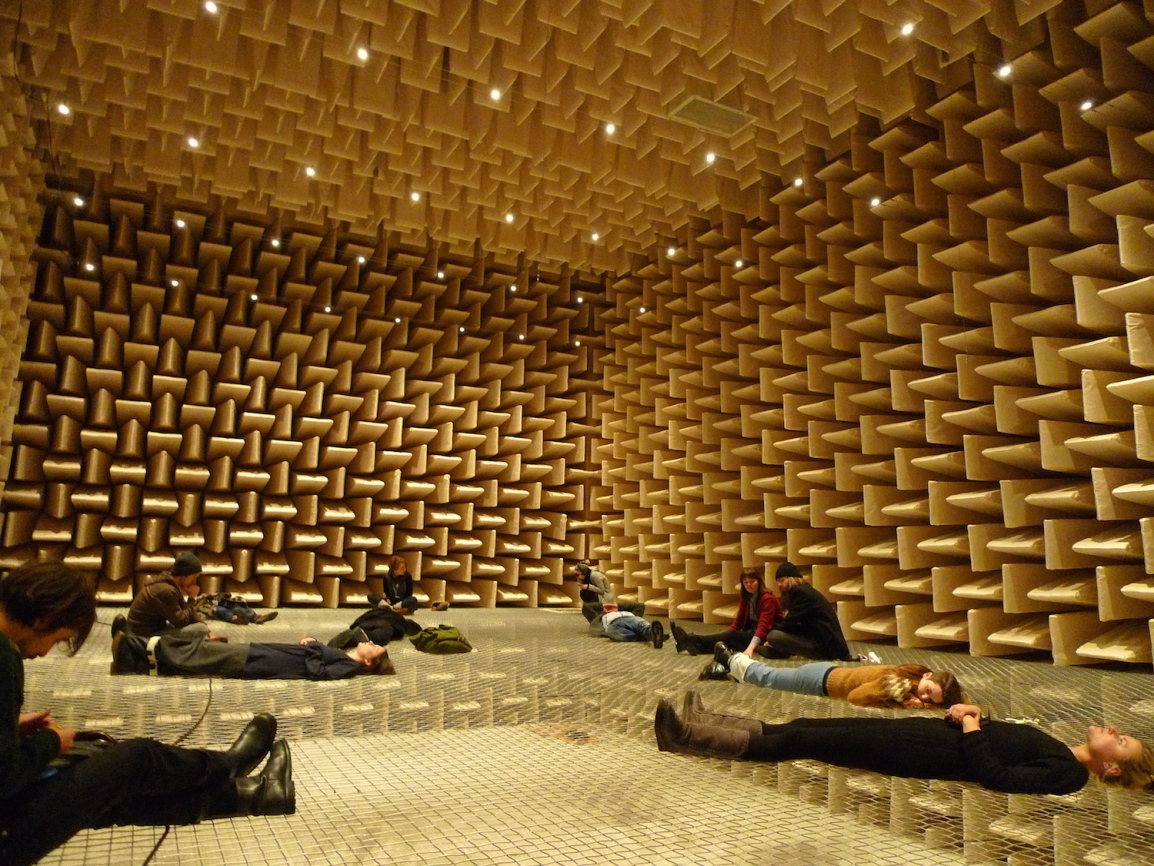Christina Werner: 'Institut für Raumexperimente' (Jan 14)
Welcome to the second event in KTH-A's series 'New School', inviting recently founded institutions for teaching and learning architecture and other spatial practices to present their pedagogy. Christina Werner is co-director (with Olafur Eliasson) of Institut für Raumexperimente since its inception at the UdK Berlin in 2009, and will present the pedagogy and methodology of the programme.
Tid: To 2016-01-14 kl 18.00
Plats: Main atelier (A108), KTH Arkitekturskolan, Osquars backe 5 (T-bana Teknsiak Högskolan)

Anechoic Chamber, Institut für Raumexperimente at Institute of Fluid Dynamics and Technical Acoustics, Berlin, Germany, 2010. Photo: Institut für Raumexperimente, UdK Berlin
INSTITUT FÜR RAUMEXPERIMENTE
(the Institute for Spatial Experiments) was affiliated with the Berlin University of the Arts from 2009 to 2014 as an experimental education and research project, led by its founding director Olafur Eliasson together with co-directors Christina Werner and Eric Ellingsen. The institute was housed in the same building as
Studio Olafur Eliasson
, so that school and studio would mutually benefit from their respective activities, and the institute expanded the university into the broader city of Berlin.
One of the central tenets in the methodology of the Institut für Raumexperimente was to curate learning situations of uncertain certainty. These teaching experiments allow unexpected and surprising ideas and energies to emerge from within the unique micro-ecologies of international guests, practitioners, educators and scientists participating across an expanse of different disciplines. Collaborations with international universities, different institutions and manifold collaborators were central to these education experiments.
For the past five years the Institut für Raumexperimente has been building a methodological model for alternatives in art education. This model is not something to be imitated – not a model for mimicry and imitation, but rather is an activator, a cultural catalyst for the right here right now, a now that resonates in the rest of the world. The Institute’s model allowed the unique micro ecologies and needs of the place or institution to shape their own direction. The purpose of this education model has been to help think and work critically at the same time, and at the same time be organically grown into a particular place – for us Berlin – without excluding the rest of the world.
CHRISTINA WERNER
has been
co-directing the Institut für Raumexperimente
since its inception in 2009 as part of the Berlin University of the Arts (UdK). Co-directing involved teaching, curating, moderating, critiquing, and administrating. Her work at the Institut für Raumexperimente emphasized not only an interest in building programmatic links between art and other disciplines but a comprehensive approach to curating the institute’s wide-ranging program of artistic practice and research; workshops, exhibitions and publications; food-related formats; perception experiments; contemplative exercises; field trips; institutional collaborations and collaborative initiatives; as well as an unobtrusive guidance in choreographing and facilitating an open environment for communication and art and knowledge production. By cultivating engagement among divergent fields of theory and practice, the program created an atmosphere of experimentation that challenged the norms by which we learn how to learn and, consequently, unfolded its curriculum in retrospect.
Christina Werner earned a degree in Cultural Studies at the Universities of Hildesheim and Tübingen and completed a postgraduate program in Critical Studies at the Lund University/Malmö Art Academy, Sweden. During 2007–09, she was curator for visual arts at the Cultural Committee of German Industries, and its artist award and exhibition series ‘ars viva’. Previously, she was director of the gallery Wohnmaschine, Berlin, was involved in opening a project space in Chinatown, Los Angeles, and co-curated various exhibition projects at the nGbK, Berlin. She has served as assistant to Okwui Enwezor, the artistic director of Documenta11, Kassel, in 2002, worked as a research assistant at the Institute of Contemporary Arts at the Academy of Fine Arts Vienna in 2000-2001, freelanced at the Heinrich Böll Foundation, Berlin and realized projects with ifa (Institut für Auslandsbeziehungen, Stuttgart) in Addis Ababa, Ethiopia. She is co-initiator of the project Acting Archives – Media Lab for Artistic Research and Education , developing collaborative art and education formats between Ethiopian, German and international artists and theorists on the subject of artistic translation, research and proactive archiving.
The event is free and open to the public – find out more on the KTH-A facebook page .
This is the second event in the series New School, inviting recently founded institutions for teaching and learning architecture and other forms of spatial knowledge production to present their pedagogy. In the first installment, Anastassia Smirnova presented the methodology and backstory of Strelka Institute in Moscow in the lecture The Paradox Box .

